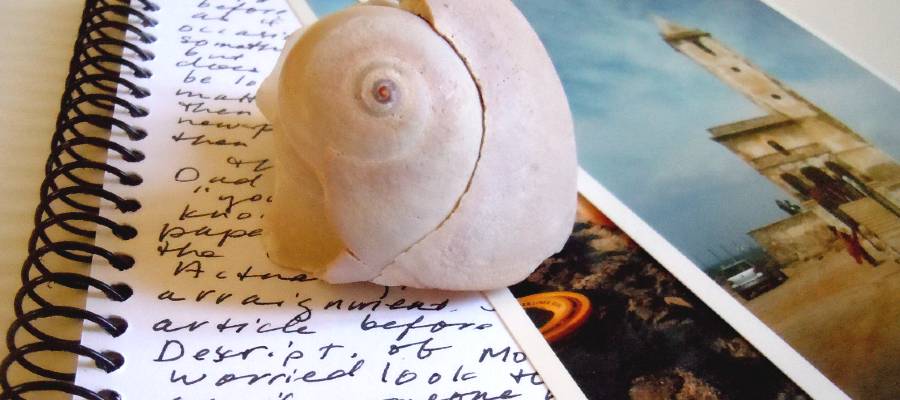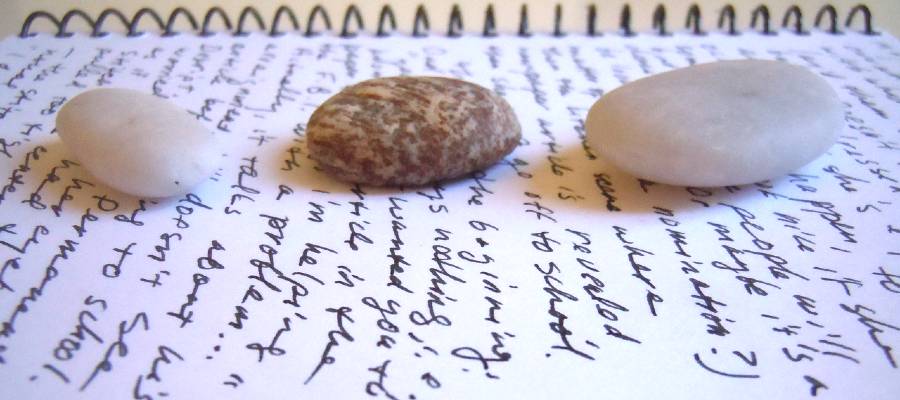Writing Journal Inspiration
Here, you'll find lots of ideas for your writing journal, as well as journaling prompts and examples from other writers. For more inspiration, join our writers' email group.
A writer’s journal is a way to keep your writing muscles in shape and to collect material you can use later in stories, memoirs, or poems. There's no right or wrong approach to journaling, but here are some ideas.
1) Write about your day.
One option is to use your journal as a diary, where you write about what happened during your day.
See how vividly you can capture your experiences with descriptive details of sights, sounds, smells and sensations. You can practice writing dialogue by reconstructing conversations you've had or overheard.
2) Write about your memories.
You can use the journal to explore your past, reliving your memories and turning them into scenes on the page.
Write about your memories in our online course on memoir writing.
3) Keep a fake journal.
Another idea is to keep a fake journal. Make up events that never happened and write about them as though they did. You can write in your own voice or in the voice of a character you invent.
This is an interesting way to get to know characters that you can use in your
fiction. Some of your fake journal entries might turn into stories.
4) Plan a writing project.
Many writers use journals to plan their writing projects, taking notes on their ideas.
Some writers make character profiles or draw pictures of their characters. You can also collect photos of people who look like your characters or places that you might use as story settings.
5) Set goals.
You can use your journal to set goals for your writing and track your progress. For example, if you're writing a novel, you might decide to write a certain number of words each week and calculate how long it will take you to finish a draft.
6) Take notes on your reading.
The books you read will feed your writing, and you can use your journal to take notes or copy out passages that inspire you. Your journal's a place to have interesting conversations with yourself.
Enjoy your freedom!
Remember, the only rule for your journal is that there are no rules.
The journal's just for you. The privacy of a journal means that you can write with absolute freedom, knowing that no one else will read it.
Examples of writers' journals
To inspire you, here are some samples of different writers' journals. Each one takes a slightly different approach to journaling.

From Virginia Woolf's journal
In this passage, Woolf records her daily activities, along with descriptive details she noticed and the thoughts they inspired:
"I read Guy Mannering upstairs for 20 minutes; & then we take Max for a walk. Halfway up to the Bridge, we found ourselves cut off by the river, which rose visibly, with a little ebb & flow, like the pulse of a heart. Indeed, the road we had come along was crossed, after 5 minutes, by a stream several inches deep. One of the queer things about the suburbs is that the vilest little red villas are always let, & that not one of them has an open window, or an uncurtained window. I expect that people take a pride in their curtains, & there is a great rivalry among neighbors. One house had curtains of yellow silk, striped with lace insertion. The rooms inside must be in semi-darkness; & I suppose rank with the smell of meat & human beings. I believe that being curtained is a mark of respectability -- Sophie used to insist upon it. And then I did my marketing."
- from The Diary of Virginia Woolf, Vol. 1: 1915-1919 (Mariner Books, 1979)
From Linda Leopold Strauss's journal
My mother, the children's author Linda Leopold Strauss, kept a specific journal for a book she was writing. She used this journal to record her ideas and also to discuss them with herself. An excerpt:
"Focus more on the relationship between the two girls.
Jill’s musings – had she sensed that Vanessa had gone through something like she’d gone through, that Vanessa would understand? Possible anger that Vanessa had chosen her only because she was the girl whose father had been arrested.
What else going on in school year? Cheerleading trials? Play? Music? Peer Counseling? Talent Show?
Maybe someone who approaches her; understands her isolation; maybe someone whose mom has cancer – comment at end (better if he were dead) becomes more hurtful.
Doesn’t want to be 'the kid whose father stole from the bank,' doesn’t want to be 'the kid whose mother has cancer.'"
From Susan Sontag's journal
Susan Sontag's journals include thoughts about her reading and lists of books that she intends to read. An excerpt:
"12/19/48
There are so many books and plays and stories I have to read -- Here are just a few:
The Counterfeiters -- Gide
The Immoralist --
Lafcadio's Adventures --
Corydon -- Gide
Tar -- Sherwood Anderson
.... "
from Reborn: Journals and Notebooks, 1947-1963 by Susan Sontag (Picador, 2009)
From Sylvia Plath's journal
The poet Sylvia Plath started keeping journals at age eleven and never stopped. Here’s an excerpt from one of her adult journals, where she discusses people and events as if talking to a close friend.
"Tonight was awful. It was the combination of everything. Of the play "Goodbye My Fancy," of wanting, in a juvenile way, to be, like the heroine, a reporter in the trenches, to be loved by a man who admired me, who understood me as much as I understood myself. And then there was Jack, who tried so hard to be nice, who was hurt when I said all he wanted was to make out. There was dinner at the country club... "
- From The Unabridged Journals of Sylvia Plath (Vintage, 2000)
Writing Journal - More Inspiration
Journal prompts: you, your life, your daydreams
Journal prompts about your memories
Journal prompts for fiction writers
Tips on starting a writing journal
Turn your writing journal into a blog
Join our 8-week course on how to write a memoir.
